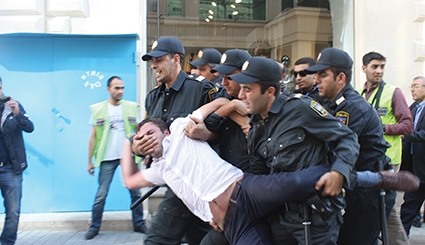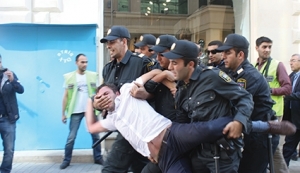U.S. Lawmakers Urge Azerbaijan to Observe Human Rights Obligations
TBILISI - Azerbaijan's President Ilham Aliyev is poised to execute a power grab that would extend his presidential term from 5 to 7 years, grant him authority to dissolve parliament and handpick a vice-president.
The measures are designed to ensure a dynastic succession and keep the Aliyev family in control of the energy-rich South Caucasus nation indefinitely.
These were just some of the disturbing revelations at a September 15 hearing conducted by the Tom Lantos Human Rights Commission at the US Capitol. The bipartisan commission expressed a sense of urgency about the need to take action because of the rapidly deteriorating situation in the country.
Aliyev's government has cracked down on dissent and rounded up journalists, political opponents, religious activists, members of civil society and prominent business leaders. Radio Free Europe/Radio Liberty and several NGOs were expelled from the country, and RFE/RL reporter Khadija Ismayilova was imprisoned on questionable charges for a year and a half before being released in May following an international outcry.
According to the commission, “Restrictive laws in Azerbaijan effectively prohibit the operation of non-governmental organizations and independent media. The Aliyev government is mired in allegations of corruption and is facing a weakening economy and a falling currency. Past elections have suffered from irregularities with vote counting, and failure to record ballots, combined with limitations on freedom of expression, freedom of assembly, and freedom of association.”
Speaking via video link, Ismayilova urged that any international financial assistance to Azerbaijan "should come with conditions on improving human rights and the democratization of the political process.”
Another witness was Ambassador Richard Kauzlarich, who served as the top U.S. envoy in Azerbaijan and is now the Co-Director of the Center for Energy Science and Policy at the Schar School of Policy and Government at George Mason University. He lamented the state of affairs in Azerbaijan. “Quiet diplomacy has not worked,” he said. The Ambassador recommended that the US recall its ambassador and impose travel bans and a freeze on assets against key figures in the Azeri regime.
Several acts of Congress, such as the Azerbaijan Democracy Act of 2015 and The Magnitsky Act of 2012, provide the legislative framework for imposing such sanctions on high-ranking Azeri officials linked to human rights violations and corrupt practices. The US administration can also impose restrictions using existing regulations.
The hearing’s third witness was Turkel Karimli, son of opposition leader Ali Karimli who is Chairman of the Popular Front Party of Azerbaijan, Board Member of the National Council of Democratic Forces and a former political prisoner. Karimli said the Azeri regime is facing civil unrest because of the harsh treatment of its citizens. He presented a detailed account of the systematic and brutal clampdown by the government on any opposition or dissent. Currently, 11 members of his party, including 5 senior officials, are in jail. Party offices have been closed or bombed.
Azeri authorities are also attempting to eradicate independent media. Azadlig, the only independent newspaper left in the country, is facing forced bankruptcy after the government blocked its access to financing. There are no independent TV channels left.
Ismayilova said that there are at least 138 political prisoners in the country. Conditions in overcrowded prisons are harsh. Torture is common. There is no independent monitoring and reporting mechanism to assess detention conditions.
This situation applies to all prisoners targeted by the regime, including some prominent businessmen who crossed President Alyiev and his top aides. The case of Jahangir Hajiyev, one of Azerbaijan’s former top bankers and a one-time contender for the much-coveted Azerbaijan Central Bank Governorship, is a perfect example.
Hajiyev, who is also an International Council Member for the Belfer Center for Science and International Affairs at the John F. Kennedy School of Government, Harvard University, has been jailed since December 2015. He is still awaiting trial and his attorney reported that he has been denied adequate medical attention despite his deteriorating health.
His case shows that the Azeri regime’s grab for power extends beyond quashing political opposition and free speech, to economic and financial interests. The bank Hajiyev used to run, International Bank of Azerbaijan (IBA), was the largest in the country. He was replaced at the helm by other bankers loyal to - and even related to - the Aliyevs.
Clearly, the fight to control the country’s financial assets smacks of corruption.
Ismayilova’s own release from prison and commuted sentence came as a result of significant international pressure and the fact that her case was taken up by Amal Clooney, a high-profile Lebanese-British human rights lawyer and wife of actor George Clooney.
Similar pressure would have to be applied to impact cases like Hajiyev's and those of other opposition activists.
Ismayilova urged the West to start “naming and shaming” the Azeri government as a way to force an end to its gross human rights violations and corruption. She also called on Western diplomats to react promptly when politically motivated arrests occur, even if the detained are not prominent individuals. Hajiyev and other business executives and community leaders being held indefinitely would fit into that category.
Karimli concluded that Azerbaijan is “at a crossroads.” He said that Aliyev shows no intention of backing down. “Public diplomacy and pressure has to be applied on the government, asking for meaningful reforms to ensure transition to democracy,” he added.
Some US lawmakers have begun to act. Congressman Chris Smith (R-NJ) announced on September 16 that he and Congressmen Joe Pitts (R-PA) and Adam Schiff (D-CA) had sent a letter to President Aliyev expressing their deep concern about Azerbaijan’s September 26 constitutional grab for power. They urged him to reconsider.
The letter specifically addressed political prisoners who, it said, were "detained on trumped-up charges and have faced mistreatment and torture at the hands of the authorities.”
The host of the hearing, Human Rights Commission Co-Chair James P. McGovern (D-MA) said he will present the new findings to his colleagues on the US House Committee of Foreign Affairs. More “tough love diplomacy” against Azerbaijan will almost certainly follow soon.
By Eugen Iladi
Edited by Nicholas Waller












